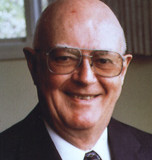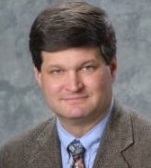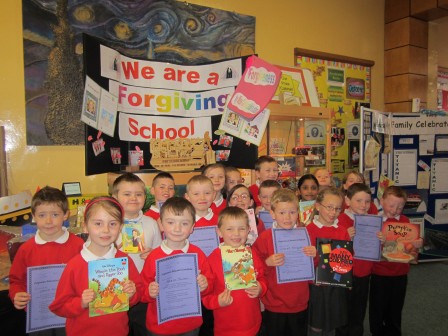Tagged: “Enright Forgiveness Process Model”
How do you know that you can skip a step in your Process Model of forgiveness without it affecting the success of that process?
We tend to rely on common sense in this situation. For example, in the Uncovering Phase, one unit in the process is to see if you have been comparing yourself with the offending person, with the false conclusion that you are less of a person than the other. If you do not make such comparisons, then you can skip that step. There are parts of the forgiveness process that seem essential to us such as:
- seeing the other person as more than the hurtful actions against you;
- being aware of a softened heart within you as you progress in forgiveness;
- bear the pain of what happened so that you do not pass that pain back to the offending person or to others.
For additional information, see The Four Phases of Forgiveness.
Reflections for the 25th Anniversary of Our International Forgiveness Institute, Inc.
It was the early 1990’s and I just recently did an interview for a Chicago newspaper. The journalist published my home telephone number within the article. For the next two weeks, it seemed as if the phone just would not stop ringing. The people who called were seeking information about how to forgive. “There is a genuine hunger out there for people to know how to go about forgiving,” was my conclusion to family and colleagues.
about how to forgive. “There is a genuine hunger out there for people to know how to go about forgiving,” was my conclusion to family and colleagues.
Because we had published the first-ever empirical article on forgiveness in a peer-reviewed journal article only a few short years before this, in 1989, there was little out there instructing people on how to forgive those who have deeply hurt them. Because of the ground-breaking work of Msgr. John Hebl, with whom I had the honor of publishing the second-ever empirical article on forgiveness in a journal, in 1993, there was emerging scientific support for our Process Model of Forgiveness.

William Walker
About this same time, the late and great Dr. William Walker of Madison, who ran radio stations, wrote a letter to me (email was not big yet). He explained that many years ago, he received his doctoral degree from the Department of Educational Psychology at the University of Wisconsin-Madison, where I was (and am) a professor. Dr. Walker explained to me that he was drawn to our forgiveness work, had the financial means to bring this to an important level, and he had an interest in joining the research. I enthusiastically agreed and a strong collegial relationship and friendship developed.

Tom Walker
When my dear friend William passed away, his son Thomas Walker took up the cause and provided the necessary funding to keep the IFI viable and expanding, as he does to this day.
Thank you, William and Thomas!
Given that we were getting some financial support and the many requests for forgiveness information continued, some of my colleagues and I decided to try to form an entity with the goal of serving people who wanted information on how to forgive. This was to start as a service entity for all who were interested in forgiving.
Our little group decided to take the non-profit route and developed the 501(c)3 entity, the International Forgiveness Institute, Inc. (IFI) in Madison, Wisconsin in 1994. A Board of Directors was formed to help guide the development of this organization. Thank you, Board Members, for your dedicated service to our IFI! At the time of its formation there was nothing “international” about this organization. Yet, it was the vision, the promise of such expansion, that led to our keeping that word “International” in the title. We, of course, started small, without even a website.
International Forgiveness Institute, Inc. (IFI) in Madison, Wisconsin in 1994. A Board of Directors was formed to help guide the development of this organization. Thank you, Board Members, for your dedicated service to our IFI! At the time of its formation there was nothing “international” about this organization. Yet, it was the vision, the promise of such expansion, that led to our keeping that word “International” in the title. We, of course, started small, without even a website.
A major turn occurred for us at the beginning of the 21st century. Because our work was having success in the mental health field with our Process Model of Forgiveness, I had an idea: Why not start to introduce forgiveness to children and adolescents? After all, if they will experience injustices, perhaps even severe injustices in this world, why not equip them with the scientifically-supported approach of forgiveness to reduce the resentment, caused by the injustices, so that they can be resilient in their emotional well-being and in their healthy family interactions?
With the idea of prevention in mind, we decided to build forgiveness curricula for children, starting in first grade (age 6 and 7). We did so through age-appropriate children’s stories, such as Dr. Seuss’ Horton Hears a Who. The children, in their own classrooms, then begin to see what forgiveness is, how story characters navigate interpersonal conflict, and what happens when people forgive. We piloted this curriculum for the first time in Belfast, Northern Ireland, did the research on this endeavor through the university, and published the first empirical evaluations of this work in 2007.

Primary 3 students at Holy Family Primary School in Belfast celebrate their “Forgiveness Graduation.”
The results were dramatic! Children, upon hearing stories and reflecting on the theme of forgiving, actually reduced in their own anger. Teachers saw greater cooperation among students in classrooms and teachers reported to us that they, themselves as teachers, improved in their own teaching skills as a result of being a forgiveness instructor.
The Forgiveness Education project grew to such an extent that we now have a complete set of curriculum guides from pre-kindergarten (age 4) all the way up to the end of high school (age 18), including an anti-bullying guide and two guides for parents: A Family Guide (for those with primary-aged children) and Strengthening Families (for those with middle-school aged children). Dr. Jeanette Knutson, Amber Osmulski, and Dr. Matthew Hirshberg helped to craft these guides. Thank you, Jeanette, Amber, and Matthew!
 The Forgiveness Education curriculum guides have been ordered by educators from over 30 countries across the world. Other international endeavors include both the Jerusalem Conference on Forgiveness and the Rome Conference on Forgiveness and a new Forgiveness Education initiative in Bethlehem in the Middle East. Thank you, Mr. Thomas and Terri Lucke, for your generous funding! We now, I think, have earned the word “International” in our organization’s title.
The Forgiveness Education curriculum guides have been ordered by educators from over 30 countries across the world. Other international endeavors include both the Jerusalem Conference on Forgiveness and the Rome Conference on Forgiveness and a new Forgiveness Education initiative in Bethlehem in the Middle East. Thank you, Mr. Thomas and Terri Lucke, for your generous funding! We now, I think, have earned the word “International” in our organization’s title.
Our long-time Director at the IFI, Dennis Blang, has been instrumental in sending far and wide information about the Forgiveness Education guides, in maintaining our website, publishing the Forgiveness News, crafting the electronic newsletters, and overseeing the everyday important activities of our institute. Thank you, Dennis! And thank you to our earlier Directors, Dr. Gayle Reed and Mary Mead!
The service work has expanded so that we now are serving homeless people, those in prisons, and we have started a bumper-sticker campaign, “Drive for Others’ Lives” as a way to help make the roads a more civil environment. Many of these new ideas come from our stellar volunteer at the IFI, Jacqueline Song. Thank you, Jacqueline!
A big thank you goes out to our long-term President, Roy Lloyd, and to our Ethics Committee members for their dedicated work in examining our protocols that impact the homeless, those in prison, and others. Thank you to those “on the ground” who oversee important forgiveness programs in Belfast (Leah Judge), Greece (Dr. Peli Galiti), and Monrovia, Liberia (Rev. Kortu Brown and Mr. George Cooper). We want to thank all who have financially contributed to our efforts over this quarter-of-a-century.
 We started with one idea: Forgiveness is important as it can quell unhealthy anger and improve mental health and relationships. Many are catching on to this idea. In our humble opinion, forgiveness should now become a natural part of families, schools, organizations, and individual hearts for the good of humanity.
We started with one idea: Forgiveness is important as it can quell unhealthy anger and improve mental health and relationships. Many are catching on to this idea. In our humble opinion, forgiveness should now become a natural part of families, schools, organizations, and individual hearts for the good of humanity.
Long live forgiveness!
Robert
I have been working on forgiving someone and it has been about two months now. I still am angry. What if my anger never goes away?
If you have been deeply hurt by another’s unfairness, please be gentle with yourself. The process of forgiving takes time. Two months is not a sufficient amount of time in your particular case. I would recommend the following:
a) Take more time in the forgiving.
b) Examine the different units of our Process Model of Forgiveness. Which of the units
do you think you have mastered? Which are still a struggle for you? Go back to those that are challenges and spend more time on them.
c) Regarding your anger, has it lessened, stayed the same, or deepened in these two months? If it has lessened, are you in control of the anger or is the anger controlling you?
d) Anger does not necessarily go away entirely. You may have some residual anger left over. This is why I asked if you now feel more control over the anger. If so, then your accepting, at least for now, that you have some residual anger may be a next step for you.
e) If your anger remains and if you feel that the anger is controlling you, then you might want to re-think whom to forgive. Sometimes, for example, a man is trying to forgive his wife and he makes little progress. At times in such cases, the husband is very angry with his mother; his wife by her actions reminds him of his mother, whom he has not forgiven. If for now he puts aside the task of forgiving his wife and turns instead to forgiving his mother, this then can open up the forgiveness process more deeply when he again turns to the goal of forgiving his wife.
f) Please have hope that your anger will lessen. I say that because the scientific evidence
shows that as people work on the forgiveness process and give it enough time, anger
lessens to a statistically significant degree.
For additional information, see The Four Phases of Forgiveness.
From Reader’s Digest: 12 Proven Steps to Truly Forgive Anyone for Anything
Juliana LaBianca is a prolific Reader’s Digest writer who conducted an extensive interview with Dr. Robert Enright, founder of the International Forgiveness Institute, for an article in the current online issue: “12 Proven Steps to Truly Forgive Anyone for Anything.”
“Robert Enright, PhD, is a pioneer in the scientific study of forgiveness,” LaBianca outlines in the prelude to her article. “Here, he breaks down his four-phase model that has helped countless patients overcome anxiety, depression, and resentment, by allowing them to truly forgive.”
While forgiving will indeed require some effort, you don’t need a mental health professional to lead you down the path of forgiveness, according to the article. It’s something you can achieve on your own, as long as you know which steps to take.
Here are the 12 forgiveness process steps LaBianca explains in her article:
- Know that forgiveness is available to everyone
- Decide you want to choose forgiveness
- Make a list
- Uncover your anger
- Commit to forgiveness
- Consider the other person’s wounds
- Consider other person’s humanity
- Feel a softening
- Bear the pain
- Give the person a gift
- Begin the discovery phase
- Repeat, repeat, repeat
“When we’ve been treated deeply unfairly by others, we should have the tools to deal with that so the effects of that injustice don’t take hold in an unhealthy way,” says Dr. Enright. Following the forgiveness process steps will provide you with those tools.
- Read the entire Reader’s Digest article.
- Learn more about Dr. Enright’s 4-phase Process Model.
- Order Dr. Enright’s Forgiveness Is a Choice self-help book.



